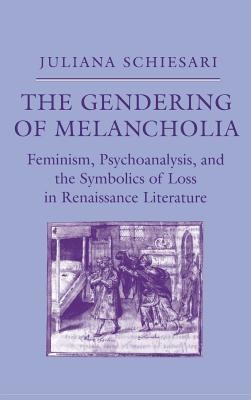
- We will send in 10–14 business days.
- Author: Juliana Schiesari
- Publisher: Cornell University Press
- ISBN-10: 0801426863
- ISBN-13: 9780801426865
- Format: 15.2 x 22.9 x 2.1 cm, hardcover
- Language: English
- SAVE -10% with code: EXTRA
Reviews
Description
The pantheon of renowned melancholics--from Shakespeare's Hamlet to Walter Benjamin--includes no women, an absence that in Juliana Schiesari's view points less to a dearth of unhappy women in patriarchal culture than to the lack of significance accorded to women's grief. Through penetrating readings of texts from Aristotle to Kristeva, she illuminates the complex history of the symbolics of loss in Renaissance literature.
The pantheon of renowned melancholics--from Shakespeare's Hamlet to Walter Benjamin--includes no women, an absence that in Juliana Schiesari's view points less to a dearth of unhappy women in patriarchal culture than to the lack of significance accorded to women's grief. Through penetrating readings of texts from Aristotle to Kristeva, she illuminates the complex history of the symbolics of loss in Renaissance literature.
Schiesari first considers the development of the concept of melancholia in the writings of Freud and then surveys recent responses by such theorists as Luce Irigaray, KaJa Silverman, and Julia Kristeva. Schiesari provides fresh interpretations of works by Aristotle, Hildegard of Bingen, and Ficino and she considers women's poetry of the Italian Renaissance, key works by Tasso and Shakespeare, and the writings of Walter Benjamin and Jacques Lacan. According to Schiesari, male melancholia was celebrated during the Renaissance as a sign of inspired genius, at the same time as public rituals of mourning led by women were suppressed.
The Gendering of Melancholia will be stimulating reading for scholars and students in the fields of feminist criticism, psychoanalytic and literary theory, and Renaissance studies, and for anyone interested in Western cultural history.
EXTRA 10 % discount with code: EXTRA
The promotion ends in 18d.09:57:30
The discount code is valid when purchasing from 10 €. Discounts do not stack.
- Author: Juliana Schiesari
- Publisher: Cornell University Press
- ISBN-10: 0801426863
- ISBN-13: 9780801426865
- Format: 15.2 x 22.9 x 2.1 cm, hardcover
- Language: English English
The pantheon of renowned melancholics--from Shakespeare's Hamlet to Walter Benjamin--includes no women, an absence that in Juliana Schiesari's view points less to a dearth of unhappy women in patriarchal culture than to the lack of significance accorded to women's grief. Through penetrating readings of texts from Aristotle to Kristeva, she illuminates the complex history of the symbolics of loss in Renaissance literature.
The pantheon of renowned melancholics--from Shakespeare's Hamlet to Walter Benjamin--includes no women, an absence that in Juliana Schiesari's view points less to a dearth of unhappy women in patriarchal culture than to the lack of significance accorded to women's grief. Through penetrating readings of texts from Aristotle to Kristeva, she illuminates the complex history of the symbolics of loss in Renaissance literature.
Schiesari first considers the development of the concept of melancholia in the writings of Freud and then surveys recent responses by such theorists as Luce Irigaray, KaJa Silverman, and Julia Kristeva. Schiesari provides fresh interpretations of works by Aristotle, Hildegard of Bingen, and Ficino and she considers women's poetry of the Italian Renaissance, key works by Tasso and Shakespeare, and the writings of Walter Benjamin and Jacques Lacan. According to Schiesari, male melancholia was celebrated during the Renaissance as a sign of inspired genius, at the same time as public rituals of mourning led by women were suppressed.
The Gendering of Melancholia will be stimulating reading for scholars and students in the fields of feminist criticism, psychoanalytic and literary theory, and Renaissance studies, and for anyone interested in Western cultural history.


Reviews